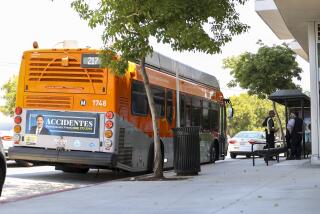Acela defies California’s bullet-train naysayers
California’s bullet train is appropriately named -- not because it will ever be as fast as a speeding bullet but because it has taken more potshots than a Montana stop sign.
Critics deride the line as a train to nowhere that will never attract the funding needed to run all the way from Sacramento to San Diego (with a spur to San Francisco) as originally envisioned. What’s more, they say, the train’s planning has been so undermined by special interests that it has no chance of running fast enough to fulfill its promise to get from L.A. to San Francisco in 2 1/2 hours. The naysayers aren’t necessarily wrong -- there are serious troubles in trainville -- but their aversion to risk is blinding them to the potential rewards. If the cynics fail to kill the train and more visionary leaders succeed in drumming up the funding needed to complete it, the line could become the most successful transportation project in the country.
Don’t believe me? Take a look at Amtrak’s Acela Express.
Currently the only high-speed train in the United States, Acela runs from Washington, D.C., to Boston via Baltimore, Philadelphia and New York. It is the only part of Amtrak’s network that actually makes money instead of losing it, and has been gobbling market share from commercial airlines. According to a recent New York Times story, 75% of travelers between New York and Washington now go by train; before Acela’s arrival in 2000, only about one-third of travelers between those cities chose Amtrak.
Business travelers prefer Acela to flying because the train has power outlets, Wi-Fi and cellphone access, making it easy to work during the trip. They also don’t face the security hassles of airports nor the long ground travel and waiting times that can erase the speed advantage of airplanes.
There’s no reason to think California’s bullet train couldn’t be as successful, and maybe more so. For one thing, California’s train is designed to move faster, with a top speed of up to 220 miles per hour; Acela has a top speed of 150 mph but averages only about 75. Train systems tend to be more popular on the East Coast than out West because of greater population density in the former colonies, but actually the pool of potential customers is at least as big for the California train. If you add the populations of the five biggest California cities on the train’s route -- San Diego, Los Angeles, San Jose, San Francisco and Sacramento -- it comes to 13.468 million, compared with 11.644 million for the five big Eastern cities served by Acela.
(OK, I cheated a little on that one: I used the population of all of Los Angeles County in the California calculation while considering only the population of New York City in the Acela figure. But that seemed justifiable considering that the city of Los Angeles is only a relatively small, oddly shaped metropolis carved out of the massive population center that is L.A. County, all of which would be served by the bullet train.)
Gov. Jerry Brown won a close victory last month when the state Senate, by a vote of 21 to 16, authorized funding for the first segment of the bullet train. That keeps it alive for now, but it still faces lawsuits from farmers angry about the tracks cutting across their land and the enormous challenge of drumming up more funding to expand beyond the 130-mile initial length of track in the Central Valley. But this is California, where we build Golden Gates and Tomorrowlands, dream factories and private rockets. When the rest of the country is groaning about $20-a-gallon gasoline and the latest airline security rule mandating preflight colonoscopies, we’ll be blasting past Bakersfield in an air-conditioned rail car while watching Hollywood’s latest on our surgically implanted iBall 3s.
ALSO:
On Hetch Hetchy, John Muir was wrong
For Olympians, faster, higher, stronger -- no longer?
Tesoro hates California policies -- but loves Californians’ money
Subscribe to Dan Turner on Facebook
More to Read
A cure for the common opinion
Get thought-provoking perspectives with our weekly newsletter.
You may occasionally receive promotional content from the Los Angeles Times.










